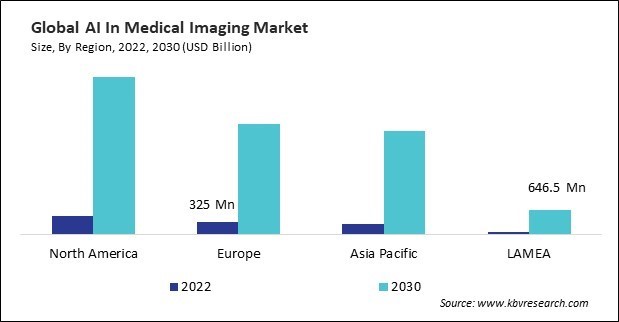According to a new report, published by KBV research, The Global AI In Medical Imaging Market size is expected to reach $10.3 billion by 2030, rising at a market growth of 32.2% CAGR during the forecast period.
The development of explainable AI models and interpretable deep learning architectures to enhance transparency, trust, and interpretability of AI-driven diagnostic decisions in clinical practice. Explainable AI enables clinicians to understand how AI algorithms arrive at their conclusions, assess the reliability of diagnostic recommendations, and incorporate AI insights into clinical decision-making. Likewise, the integration of AI-powered imaging analysis tools into telemedicine platforms and remote monitoring systems for virtual consultations, remote diagnostics, and teleradiology services.

The Deep Learning segment is registering maximum revenue in the Global AI In Medical Imaging Market by Technology in 2022; thereby, achieving a market value of $5.8 billion by 2030. Deep learning algorithms, particularly convolutional neural networks (CNNs), have demonstrated superior performance in analyzing medical images compared to traditional machine learning techniques. Deep learning models can automatically learn complex features and patterns from large datasets, leading to higher accuracy, sensitivity, and specificity in detecting abnormalities and diagnosing diseases in medical imaging.
The MRI segment would exhibit a CAGR of 32.5% during (2023 - 2030). MRI imaging continues to evolve with the development of advanced imaging techniques and sequences, such as diffusion tensor imaging (DTI), spectroscopy, and dynamic contrast-enhanced MRI (DCE-MRI). AI algorithms can optimize image acquisition parameters, reconstruct images, and extract meaningful features from complex MRI datasets, enabling radiologists to derive clinically relevant insights and improve diagnostic accuracy.
The Hospitals segment is generating highest revenue in the Global AI In Medical Imaging Market by End-use in 2022; thereby, achieving a market value of $5.2 billion by 2030. Hospitals typically serve many patients, leading to a high volume of medical imaging studies, including x-rays, CT scans, MRI scans, and ultrasound images. The sheer volume of imaging data generated in hospitals necessitates efficient and accurate interpretation, making AI-powered image analysis tools invaluable for radiologists and clinicians.
The Breast Screening segment is experiencing a CAGR of 31.7% during (2023 - 2030). Increasing breast cancer incidence rates and patient demand for early-stage diagnosis, facilitating prompt and precise treatment, are driving the demand for breast screening services. Also, supportive government initiatives to enhance clinical interpretation and expand access to breast cancer screening technologies are expected to fuel market growth. For instance, as reported by the Government of Goa, a total of 21,311 screenings were conducted until July 2022 under the Swasth Mahila Swasth Goa Project, resulting in the detection of nine breast cancer cases since the project’s initiation.
Full Report: https://www.kbvresearch.com/ai-in-medical-imaging-market/
The North America region dominated the Global AI In Medical Imaging Market by Region in 2022, and would continue to be a dominant market till 2030; thereby, achieving a market value of $4.1 billion by 2030. The Europe region is poised to grow at a CAGR of 31.7% during (2023 - 2030). Additionally, The Asia Pacific region would witness a CAGR of 33.3% during (2023 - 2030).
By Technology
By Modality
By End-use
By Application
By Geography
 Unique Offerings
Unique Offerings